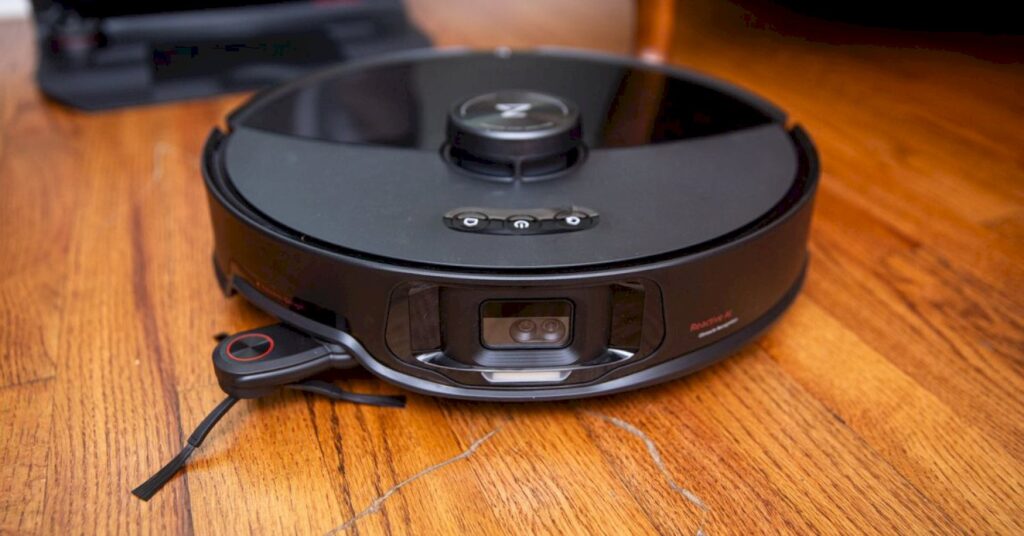
Apple has announced that Apple Home will finally support robot vacuums with iOS 18. This was one of just a few updates to its smart home platform that Apple announced at WWDC 2024. The company also revealed that hands-free unlocking is coming to compatible smart door locks as well as the ability to share guest codes for access to your home (another thing we’ve been impatiently waiting for). Plus, there’s a new electricity usage feature coming to the Home app, although it’s limited to Pacific Gas & Electric users in California at launch.
Apple said that the “Home app now supports the core functionality of robot vacuum cleaners, such as power control, cleaning mode, vacuum, mop, and charge status.” The floor cleaning devices can also participate in automations and scenes and be activated with voice control using Siri, so you can tell it to go clean your kitchen.
:format(webp)/cdn.vox-cdn.com/uploads/chorus_asset/file/25485586/lcimg_f7e5cf64_224a_4049_92e7_2f5e16215efa.jpeg)
The feature most likely comes through Apple Home’s support of Matter, which added support for robot vacuums / mops in Matter 1.2. The Matter spec enables starting and stopping the robot, adjusting cleaning modes (dry vacuum, wet mopping), and receiving progress notifications and alerts.
However, Matter doesn’t support advanced features — like room mapping and keep-out zones (areas the robot shouldn’t go). This means that while Apple Home users should be able to add their robot directly to the Home app without using the manufacturer’s app or cloud, to access more advanced features, you’ll need to download that third-party app.
:format(webp)/cdn.vox-cdn.com/uploads/chorus_asset/file/25485703/Screenshot_2024_06_10_at_3.48.17_PM.jpg)
Image: Apple
Apple is bringing hands-free unlocking to compatible UWB-enabled locks with Home Key, allowing you to have the door unlock automatically when you’re six feet away. You’ll need to be carrying your iPhone or have your Apple Watch on to authenticate yourself. The feature will work with Apple Watch Series 6 and later and iPhone 11 and later.
Auto-unlocking was first developed by August and is now in most Yale locks, too. A number of other manufacturers have also introduced similar features. This should bring the ability to any Home Key-compatible lock that supports UWB.
You’ll also be able to finally share access with guests to control locks, garage doors, and security systems as well as customize access based on time and other factors.
:format(webp)/cdn.vox-cdn.com/uploads/chorus_asset/file/25485569/Apple_WWDC24_tvOS_18_Home_app_guest_access_240610.jpg)
Image: Apple
A new electricity usage page in the Home app’s Energy section will show your electricity usage through a connection to your utility. It will launch with a partnership with PG&E in California but hopefully expand to more utilities in the future.
Home energy management is an important ability of smart home devices, giving you tools to understand how your home uses energy and potentially allowing you to control it more efficiently. There are two main approaches: install devices that can monitor their energy usage, something the Apple Home app doesn’t currently support, or use an app that can communicate with your utility directly to get the information, which is what Apple is doing here.
Ultimately, a combination of the two is likely to be the best path. But what will really make the difference is a service that can do a lot of the management for you. Hopefully, this is Apple’s first step in that direction.
:format(webp)/cdn.vox-cdn.com/uploads/chorus_asset/file/25485570/Apple_WWDC24_tvOS_18_Home_app_electricity_usage_240610.jpg)
Image: Apple
WWDC is traditionally where Apple has announced new features for its Apple Home smart home platform, giving developers time to integrate them into its devices ahead of the launch of iOS 18, iPadOS 18, macOS 15, watchOS 11, tvOS 18, and HomePod OS in the fall. The energy usage and robot vacuum features announced for Apple Home are listed as coming “later this year,” so they may not arrive with the first rollout of iOS 18.
While the updates are often minor, we sometimes get things like an all-new Apple Home app. This year was a relatively minor update. I, for one, had hoped to see support for many more of the device types Matter supports, including TVs, washing machines, and fridges. I hope we don’t have to wait until the fall for those to arrive.
Apple Home has undergone a significant shift in the last few years as Apple transitions its smart home platform from purely HomeKit to an architecture where HomeKit runs on Matter. Apple is a founding member of the new smart home standard and contributed HomeKit as the “foundation of this new standard.” For Apple Home users, Matter opens the platform to more device types than it has supported to date.
Matter is an interoperability and communication standard that allows any Matter-enabled smart home device to work with any Matter platform, meaning all Matter devices should work with Apple Home. However, the platforms have to add support for the new device types, and Apple has been slow to do so. With robot vacuums now on the map, though, let’s hope there are more devices coming soon.
What is Matter?
Matter is a new smart home interoperability standard designed to provide a common language for connected devices to communicate locally in your home without relying on a cloud connection. It is built to be secure and private, easy to set up, and widely compatible.
Developed by Apple, Amazon, Google, and Samsung (and others), Matter is an open-sourced, IP-based connectivity software layer for smart home devices. It works over Wi-Fi, ethernet, and the low-power mesh networking protocol Thread and currently supports over 30 device types. These include lighting, thermostats, locks, refrigerators, dishwashers, dryers, ovens, smoke alarms, air quality monitors, EV chargers, and more.
A smart home gadget with the Matter logo can be set up and used with any Matter-compatible ecosystem via a Matter controller and controlled by them simultaneously, a feature called Multi-Admin.
Amazon Alexa, Google Home, Samsung SmartThings, and Apple Home are some major smart home platforms supporting Matter, along with hundreds of device manufacturers.
